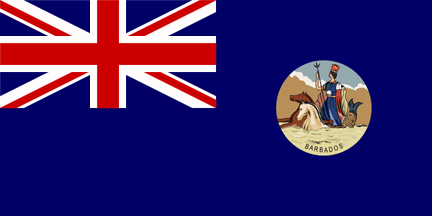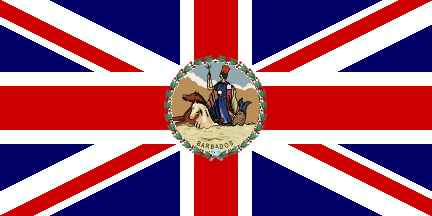
image by Martin Grieve, 3 May 2009

FOTW beschäftigt sich mit der Wissenschaft der Vexillologie (Flaggenkunde).
Alle auf dieser Website dargebotenen Abbildungen dienen ausschließlich der Informationsvermittlung im Sinne der Flaggenkunde.
Wir distanziert uns ausdrücklich von allen hierauf dargestellten Symbolen verfassungsfeindlicher Organisationen.
Last modified: 2021-08-25 by rob raeside
Keywords: barbados | neptune | britannia | trident |
Links: FOTW homepage |
search |
disclaimer and copyright |
write us |
mirrors
See also:
The old flag of Barbados (blue ensign with Neptune) was in use
until 1958, and also in the governor's flag (Union Jack with a
white disk with wreath). After a short period in the West Indies
Federation, on 1961 Barbados became autonomous, and a new shield
was granted. The new shield was probably used in the blue ensign
(within a white disk) and in the Union Jack of the governor
(within a white disk with wreath). The current national flag was
adopted on 30 November 1966.
Jaume Ollé, 5 May 1997
The image below is the 19th Cent. flag (used until 1966).
Source: Znamierowski's "The World Encyclopedia of
Flags" [zna99].
Blas Delgado Ortiz, 11 September 2000
Blas exactly refers to the illustration p. 108 (bottom) at [zna99], with two rows of three Blue
Ensigns each. In the first row there is Barbados (XIXth century -
1966).
Ivan Sache, 25 Febuary 2001
There are a number of errors in the reports on Barbados
Colonial Flag. The figure in the badge is Britannia not Neptune.
As far as I know this is incorrect that this badge was use only
until 1958 and the badge continued to be used until 1966. There
was no "new shield" in connection with internal
self-government in 1961.
The badge on the Blue Ensign labelled 1958 to 1966 is the Arms
which were not granted until 21 Dec 1965.
Barbados joined the Federation of the West Indies in January 1958
and remained in it until 1962 when it came to an end with the
withdrawal of Jamaica. In May 1962 Barbados helped form the
West Indies Federation which had its federal capital in
Barbados. The Federation was abandoned in 1966 and Barbados
became independent.
Barbados used a circular seal in 1870 flag.
David Prothero, 6 October 2001 and 8 April 2005
The reason she holds a trident, according to Politikens
Flagbook, is to symbolize her rule over the seas (or if you
prefer "the waves").
Peter Hans van den Muijzenberg, 7 October 2001
From EMC Barraclough's "Flags of the world (1965"
page 102" "The badge of Barbados displays the
well-known design which appears on the stamps of that colony. A
female figure, crowned and attired in robes of crimson and
ermine, holding a trident is standing in a shell which is being
drawn along the surface of the sea by two sea-horses. On the
Union flag the garland surrounds the badge; on the Blue Ensign
the garland is omitted."
I am not sure why Barraclough is reticent in describing the
female figure as that of Brittania, but I..O. Evans in "The
observers book of flags (1966) is more open: "The badge of
Barbados represents Brittania, crowned and holding her trident,
standing in a sea-shell and drawn by two sea-horses."
Martin Grieve, 3 May 2009

image by Martin Grieve, 3 May 2009

image by Martin Grieve, 3 May 2009
1870.gif)
image by Martin Grieve, 3 May 2009
17xx.gif)
image by Juan Manuel Gabino Villascán, 3 January 2005
In a Barbadian coin (penny) dating of 1792, is engraved what
could be the correct version of the first Barbados coat of arms.
Here is a reconstruction, colors are assumed. According to the
coin, what we called "Neptune" is actually George III,
king of the United Kingdom from 1738 to 1820. The horses are not
dolphin-tailed, while George III is driving a sea-chariot. In the
coin, the name of the island is spelled: Barbadoes. I am
not sure if such a name was used in the defaced blue ensign. It
is very clear, George III is wearing crown, and one order (I
don't know what could it be). This is probably also that the
badge was adopted not in the 1800s but late 1700s.
Juan Manuel Gabino Villascán, 3 January 2005
This is the sort of design that was used on coins; it is not a
coat of arms. The first arms for Barbados were not granted until
1865. Colonial badges on British ensigns were not introduced
until 1865. The first Barbados flag badge, based on the seal of
the colony, was introduced in 1870. On it, the name was spelt
" Barbadoes ".
David Prothero, 3 January 2005
To confuse things further, the colony's first stamps - in 1852
- were marked "Barbados", but prior to that they used a
rubber handstamp similar to a modern postmark (as was common in
the early days of stamps) marked "Barbadoes". The
handstamp was first used in 1849.
James Dignan, 4 January 2005
I checked my documents and found British flag chart published
in 1905 shows the badge with "Babadoes" inside and
British flag book published in 1955 shows "Babados".
Nozomi Kariyasu, 5 January 2005
There seem to be some differences between the seal of the
Colony, as depicted here and as it is shown on the postage stamps
of the colonial period. The principal difference seems to be that
the angle at which the Trident is held in Britannia's hand tends
to vary considerably, from almost vertical on some stamps to the
acute angle on the badge shown on the colonial flag.
Ron Lahav, 29 April 2005
Hosted by: Fanshop-Online.de und Handy-Shop.de
Tipp: Apple iPhone 12 im Shop